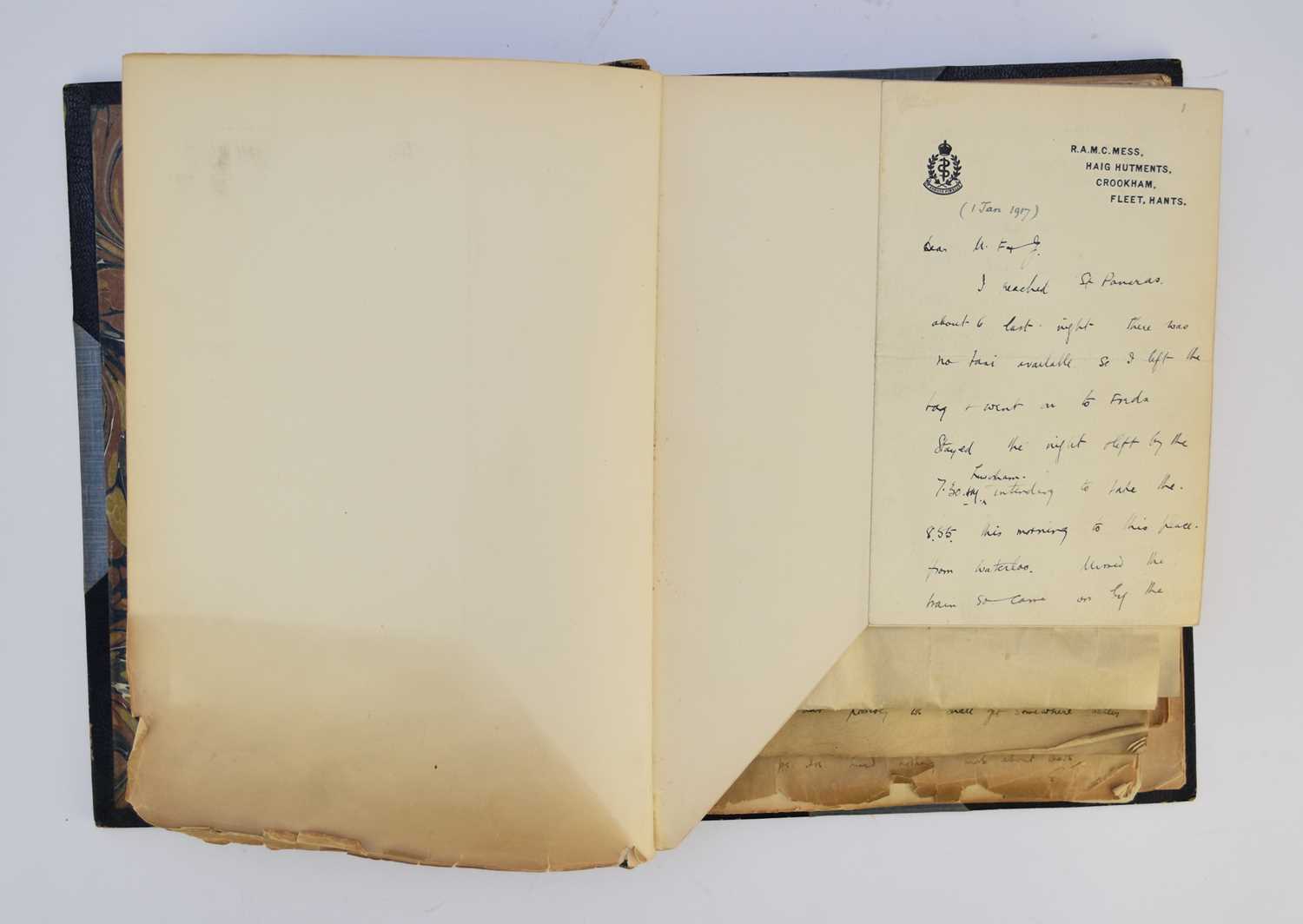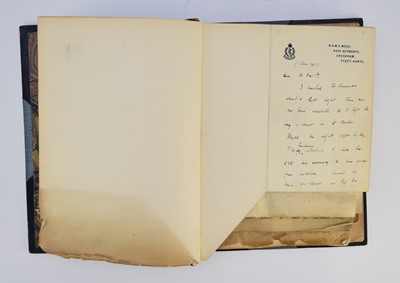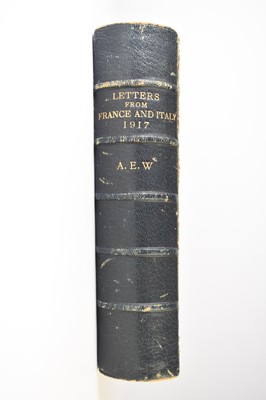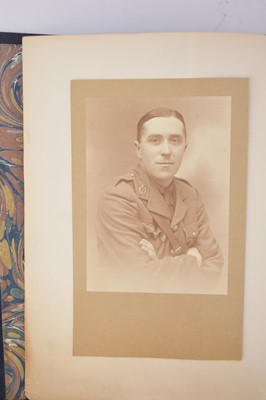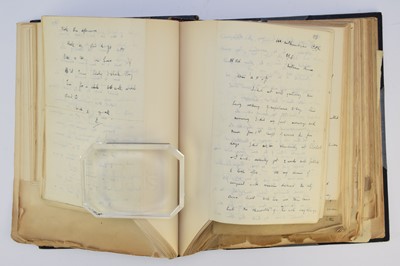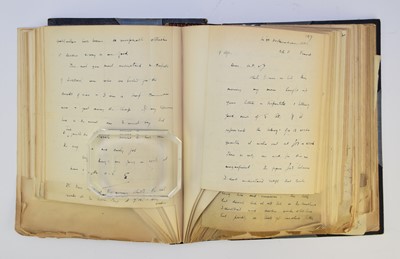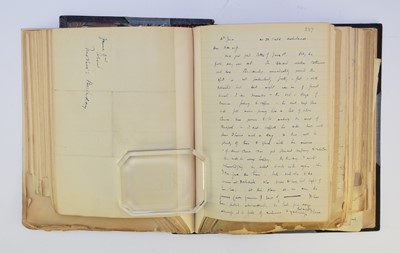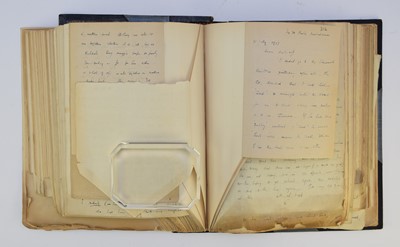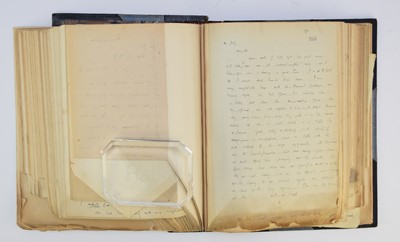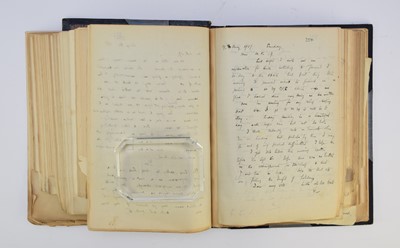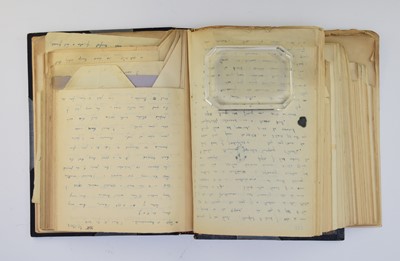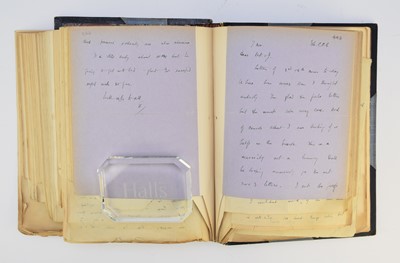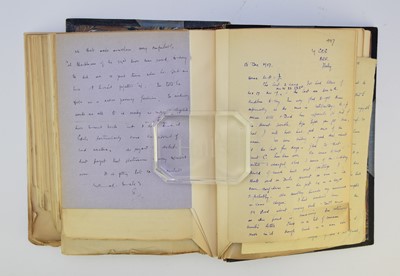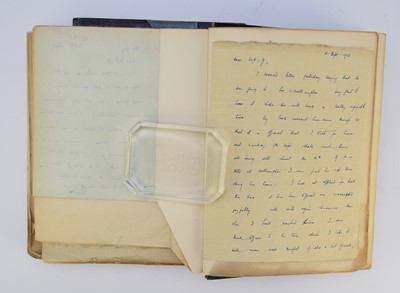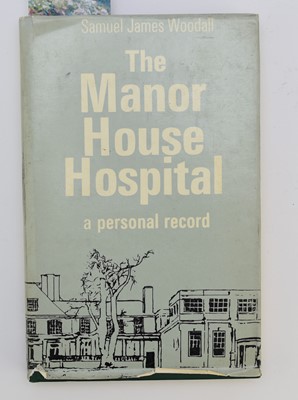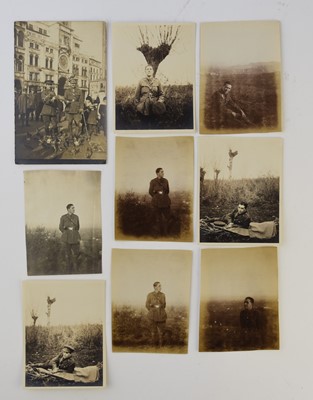Ending 20th Feb, 2024 16:00
Timed Militaria, Maritime and Naval Auction
Sir Ambrose Edgar, Surgeon - WW1 Letters from France and Italy
FIRST WORLD WAR LETTERS. Woodall (Sir Ambrose Edgar, later Baron Uvedale of North End) (1885-1874). Surgeon, served with the Royal Army Medical Corps in the British Expeditionary Force on the Western Front. Resident Surgeon at Manor House Hospital from 1920-58. A bound volume of around 300 letters covering the period 1st January 1917 - 31st December 1917, with a portrait of Woodall on the front leaf, to 'M, F and J' (Mother, Father and probably his brother, Samuel 'J' Woodall), mostly written in France. With seven further loose portrait photographs of Ambrose, a copy of Samuel James Woodall, 'Manor House Hospital' and photocopied research.
The letters begin when Woodall is based at Haig Hutments in Crook, Fleet. His early letters document some elements of disdain his fellow doctors, 'Certainly this war is doing a lot of harm to our profession. It has gone to the heads of the younger men & GPs very badly. About one in twenty is fit for a position of any responsibility. The sooner it is concluded the better. Most of those who have been out to the front seem to regard it as a picnic on the other hand there are always a proportion of decent men - small perhaps but still there.'
Other excerpts include:
[21st January, No. 2 General Hospital, Quai De Escales, Le Havre] 'Am at present in a hut described as the 2nd Gen. Hospital where I may remain a day or weeks'. This proved to be prophetic, with the next letter dated 24th January stating that he is now at No. 1 General Hospital, Eretrat, waiting for forward orders. From 10th February, he writes from the Cyclist’s Base Depot at Rouen, contending with cancelled orders, sharing a tent with other men and 'a Major from Egypt who snores'.
[2nd March] 50th Northumbrian Casualty Clearing Station, Northern France. ‘The principal enemy is boredom’ … ‘we can hear the guns plainly enough in the evening here but we much farther away from the trenches than we were at the 46th CCS. There are 600-700 patients in the hospital, most of whom have come down suffering from scabies treminous’.
[9th March] ‘The day before yesterday I went out to see another camp. There had been an air battle over the German lines and an aviator had been killed – an observer – the officer acting as pilot on the same machine had escaped by a miracle. It appears that they were surprised in the air and the plane was riddled with bullets before they were aware of the presence of the enemy. The pilot who escaped was suffering from shock but he had roused himself to attend the funeral of his companion who was also his particular chum’.
[15th March] ‘Gordon Watson is surgical consultant for this area… his brother was in the combatant ranks and was badly wounded for 5 days he lay out in no man’s land supporting himself with rations taken from dead me, then he was found and brought to hospital. Gordon Watson had one of his vein’s opened and blood was transferred from him into his brother, but the brother died and Watson is suffering from blood poisoning in the arm. Strange things happen in this war.’
[6TH April] … ‘I went round to the prisoner of war camp also to the aviators camp. The German prisoners looked sleek and well nourished and were far superior in physique to our own wretches of the labor camp as you will understand when I say that they were front line men while our labourers are there because they are unfit for home defence. From there I went to the aviators whom I found very depressed. Several of their number were killed in early this morning and the Captain a man named Smith seemed cut to the quick, they are only boys most of them … he told me that the average length of a man’s life in that camp was just 2 months’.
[9th May, 13 Durham Light Infantry, B.E.F, France]
‘The officers at the mess seem sufficiently arguable – they are much addicted to foul language and horseplay among themselves, also of course a lot of alcohol is put down but these things are just the ordinary accomplishments of military life and the chief accomplishment of that perfect gentleman the British Officer’
[13th May] ‘I went to bed early last night and slept till perhaps 2 o’clock when I woke up to find myself in the midst of a ? bombardment, the Boche was raining stuff on our lines under the cover of which he made a raid which was sent off duly. Our casualties kept me bust from about 3 to 7. So far as I could make out they were all from the front trench about a mile from here where there was hand to hand fighting, bombing and machine gun practice’.
Edgar Woodall’s obituary, courtesy of the Royal College of Surgeons, reads
“Ambrose Edgar Woodall was born in Eccles, Lancashire, on 24 April 1885, the second son of the Reverend Samuel Russell Woodall, a Primitive Methodist minister. He was educated at Manchester Central High School, and having won a science scholarship from Lancashire County Council, he became a student of Manchester University, graduating BSc in 1905 and MB ChB in 1908, winning the Renshaw Exhibition, the Bradley Surgical Prize and the Leech Junior Research Fellowship. He then spent a year as a demonstrator in physiology and a further year as a research fellow, graduating MSc in 1909 and MD in 1911. He held various resident posts at Manchester Royal Infirmary from 1910 to 1913 before enlarging his experience at the London and St Bartholomew's Hospitals.
He served in the RAMC from 1915 to 1919 and after obtaining the FRCS in 1916, he went to France and later to Italy before returning to London as resident surgeon to the Manor House Hospital, a post he held from 1920 to 1958. During these years he was medical advisor to the National Union of Railwaymen and other trade unions and an 'expert medical witness'. He was surgical specialist to the Ministry of Pensions from 1921 to 1924. His knighthood, conferred in 1931, was regarded as a reward for his services to Manor House Hospital and the Trades Unions whose hospital it is. As a medical man he established a unique position in socialist circles. George Lansbury, Tom Williams, Ben Tillett and Lord Citrine were among his distinguished patients. He was a member of the Central Medical War Committee during the Second World War and he was made a Baron in 1946.
In 1949, at the age of 63, he married Joyce Eleanor, the widow of the Rt Hon H B Lees-Smith, PC, MP. There was no heir. He died on 2 February 1974, aged 88 years.”
Sold for £1,000
